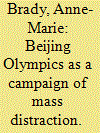| Srl | Item |
| 1 |
ID:
164767


|
|
|
|
|
| Summary/Abstract |
This study provides one of the first empirical tests of the political impact of dibao, China's anti-poverty cash transfer programme. Using the China Family Panel Study 2010 data set and a propensity score matching method, the authors examine whether and the extent to which dibao benefits have impacted recipients' assessment of local government performance. To investigate the heterogeneity effect of dibao, the authors conducted separate analyses for urban and rural samples. Results have shown that receiving dibao benefits had a significant and positive impact on citizens' assessment of local government in China. Nonetheless, the subsample results suggest that the positive and significant impacts of dibao benefits might be driven mainly by the rural sample. Overall, the study implies that China's dibao policy has achieved a mixed success in alleviating discontent and boosting popular support for the government.
|
|
|
|
|
|
|
|
|
|
|
|
|
|
|
|
| 2 |
ID:
089389


|
|
|
|
|
| Publication |
2009.
|
| Summary/Abstract |
From 2006 to 2008 the predominant theme in the Chinese media was preparations for the 2008 Olympics. These preparations were not merely about putting up new sports stadiums; China also underwent a massive public etiquette campaign, aimed at "civilizing" Chinese citizens. This was nominally so they could be good hosts during the Beijing Olympics. The 2006-08 emphasis on Olympic-related news coverage and the ongoing public morals campaign was what I have called a campaign of mass distraction: a propaganda campaign designed to mobilize the population around a common goal, and distract them from more troubling issues such as inflation, unemployment, political corruption and environmental degradation. This article discusses China's Olympics propaganda within the context of the modernization of the Chinese Communist Party's propaganda system - which has included incorporating practices originating in modern democratic states - and considers in what way changes in the propaganda system reflect changes in China's system of political control.
|
|
|
|
|
|
|
|
|
|
|
|
|
|
|
|
| 3 |
ID:
151285


|
|
|
|
|
| Summary/Abstract |
Many observers see mutual distrust as a major reason for increasing tensions in East Asia, but few studies systematically explore exactly how trust, or the lack of it, influences international cooperation in the region. We examine the microfoundations of international trust in East Asia by analyzing an original survey of Chinese urban residents’ attitudes toward Japan and South Korea. We find that generalized trust, or the belief that other nations have benign intentions, provides the most important driving force of trust toward Japan and South Korea. This, in turn, has a positive effect on preferences for interstate cooperation. We also find that, contrary to conventional wisdom, nationalism and historical memory have little or no effect on international trust. Our analysis enhances our broader understanding of international trust by clarifying its sources and consequences. It also suggests some important policy implications for Sino–Japanese relations and Chinese foreign policy.
|
|
|
|
|
|
|
|
|
|
|
|
|
|
|
|